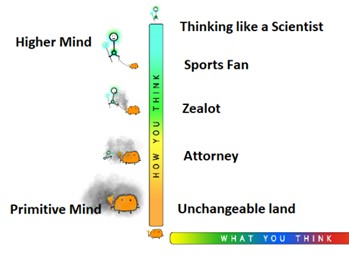
Navigating Uncertainty
March 2, 2025
Evolution
April 27, 2025I’m honored to welcome my dad as a guest writer on But Few Are Chosen. His journey through faith, doubt, and discovery has been deeply personal, and I’m grateful he’s willing to share his thoughts here.
In this post, he explores The Gift of the Holy Ghost—a doctrine he once held sacred but has since examined through a new lens. His reflections dive into the nature of belief, skepticism, and the ways we seek truth.
The Gift of the Holy Ghost
By Wallace Haws
The Church of Jesus Christ of Latter-day Saints maintains the dogma that the Holy Ghost, a member of the Godhead with attributes like the Godhead, is a personage in the form of a man but with a Spirit body, not a physical body as possessed by the other members of the Godhead. I received the Gift of the Holy Ghost after baptism at eight years old, which meant I could have the constant companionship (he can dwell in us: DC 130:22) and inspiration of the Holy Ghost.
One thing I struggled with during my faith crisis was how to reconcile memories of spiritual confirmation of the Holy Ghost that the Church was true. I wondered if I was denying the Holy Ghost, which is a scary thing given the scriptural penalties pronounced on those who do.
I admit that by the time I came to grips with my spiritual experiences, I had already lost confidence in the prophet Joseph Smith and was barely clinging to a belief in the church, but ironically, it was a talk given by Elder Renlund and Elder Bednar that finally helped me realize the Holy Ghost is not real. But before looking at those two talks I think it important to talk about skepticism and how minds think to learn truth.
Tim Urban, in his book “What’s Our Problem”, groups how people determine truth into the categories of a Scientist, Sports Fan, Attorney or Zealot. Each group will approach how to learn truth differently. I quote from his book:

“The Scientist will form a hypothesis from the bottom up. Rather than adopt the beliefs and assumptions of conventional wisdom the scientist is careful who he trusts because trust assigned wrongly has the effect of creating the illusion of knowledge, which is worse than having no knowledge at all. The scientist has mastered the art of skepticism.
When you’re thinking like an Attorney, you start with the assumption that the Holy Ghost is real. From there you’ll go through your due diligence, cherry-picking evidence and piecing together an argument that leads right where you want it to.
If someone really wants to believe something—that the Earth is flat, that 9/11 was orchestrated by Americans, that the CIA is after them—the human brain will find a way to make that belief seem perfectly clear and irrefutable.
For the Attorney, the hypothesis formation stage is really a belief-strengthening process. They inevitably end up with the same viewpoints they started with, now beefed up with a refreshed set of facts and arguments that remind them just how right they are. In the hypothesis testing phase, the Attorney’s refusal to genuinely listen to a dissenter, combined with a bag of logical fallacy tricks and their strong sense of conviction, ensures that they’re an absolutely infuriating person to argue with.
Zealot
A Zealot holds their beliefs so dear that your Higher Mind has no influence at all over how you think about them. Changing your mind feels like an existential threat.
“While the Scientist’s clear mind sees a foggy world, full of complexity and nuance and messiness, the Zealot’s foggy mind shows them a clear, simple world, full of crisp lines and black-and-white distinctions.” When you’re thinking like a Zealot, you end up in “unconvinceable land”. “When you end up here, it means you’ve become a disciple of some line of thinking—a religion, a political ideology, the dogma of a subculture. Either way, your intellectual integrity has taken a backseat to intellectual loyalty.”
How does the Holy Ghost communicate with us? Elder Rasband gave an answer to this question in April 2017 “My experience has been that the Spirit most often communicates as a feeling. You feel it in words that are familiar to you, that make sense to you, that prompt you.”
Listening to Elder Rasband’s talk, a zealot would immediately elevate the power of “feelings” from the Holy Ghost as the most important way to know truth, being that the knowledge so given would be coming from a member of the Godhead. Surely a person could tell when those feelings were coming from a member of the Godhead! If so, why the need for Elder Renlund’s talk?
Elder Renlund October 2022, “A Framework for Personal Revelation”:
His talk provided a framework around discerning revelation from the Holy Ghost, helping the members determine if their inspiration truly came from the Holy Ghost, using examples of people who thought they were inspired but were deceived. He didn’t say it, but there would be no need for such a talk if confusion about the Holy Ghost was not a problem. If the few experiences I have seen in my life are any indication of what is happening in the 17-million-member Church, then Elder Renlund was aware of all the foolish things people do who claim to be guided by the Holy Ghost and he wanted to put a stop to it.
Elder Renlund’s framework is to ask if the prompting agrees with the scriptures, whether the revelation deals with something within your area of responsibility, whether it is in harmony with the commandments of God, whether God has already answered the question, and most importantly whether it agrees with the living prophet.
His framework seems like reasonable counsel, but this talk immediately disturbed me. I asked myself, if the Gift of the Holy Ghost is such a supernal gift of a member of the Godhead, then there should be no mistake in recognizing when it speaks; i.e. a person should easily know when he is inspired by such a magnificent gift and wouldn’t need a “framework” to test its validity. Also, it seems rather convenient for the apostles to have the ultimate say on inspiration from the Holy Ghost!
Elder Renlund explains that a person can be deceived into thinking they have received the Holy Ghost when they really are deceived, which, to me, is an admission that nobody can tell whether personal inspiration is the Holy Ghost or just your body chemistry.
Elder Bednar while answering questions (video available on Youtube):
He said a question he often gets is, “How do I know if it is the Holy Ghost or just me and how do I know the difference?”
He said the answer is simple: “Quit worrying about it! Quit stewing, quit fussing, quit analyzing! Press forward with faith in the Lord Jesus Christ. Be a good girl or a good boy. Honor your covenants, keep the commandments and I promise you in the name of the Lord Jesus Christ that your steps will be guided.”
Elder Bednar’s response has become cliche in the church, “It doesn’t matter. If you are a good girl or a good boy keeping the commandments, you will be guided.”
For me, Elder Renlund’s and Elder Bednar’s talks amount to an admission that nobody knows when the Holy Ghost is communicating with them.
Would it be important to know if inspiration is the Holy Ghost or not? Absolutely! I have learned through my personal life experience and the experiences of real people I have 1st or 2nd hand knowledge of which has taught me it is very important to know whether or not the Holy Ghost is real for the simple reason people have committed extremely weird and nonsensical things believing the Holy Ghost inspired them, even when that inspiration would have passed Elder Renlund’s filter. A stupid idea supported by God is especially dangerous!
If you were thinking like a scientist pondering the question “Is the Holy Ghost real?”, you would be looking for evidence to answer the question. But if you are thinking like an attorney or zealot, Elder Bednar’s and Elder Renlund’s answers are sufficient: “Quit worrying about it!” which obviously benefits the hierarchy.
The Church teaches the primary way the Holy Ghost communicates to us is through “feelings” and a zealot will make major life decisions based on nothing but “feelings”. Are “feelings” a reliable way to know the truth? Scientific evidence suggests that relying solely on feelings as a method to know truth is unreliable and inconsistent and can lead to biases and inaccurate conclusions. A scientist believes that your reasons for doing things in life should be based on sound reasoning.
If you met an alien from outer space who had never heard anything about the Holy Ghost, what evidence would you give him that the Holy Ghost is real?
If the Holy Ghost tells a member of a Protestant church that the LDS Church is false, and the Holy Ghost tells you their religion is false, how would an alien know who is right? Why would the Holy Ghost be inconsistent?
Is it reasonable that a ghost can enter and exit your body at will?
Is it reasonable that the same ghost can simultaneously enter and exit the body of 8.5 billion people on the earth?
Is it reasonable the same ghost (which is a “personage”, i.e. has a body of Spirit) can simultaneously occupy the bodies of 8.5 billion people on the earth?
Who would an alien likely believe, the zealot who claims he has the constant companionship of the Holy Ghost but has no evidence other than subjective feelings to support it or the scientist who has shown by empirical evidence “feelings” associated with the Holy Ghost can be generated in the lab?
When I reflected on my spiritual experiences, I realized there are plausible explanations for every one of them. The Church indoctrinated me my whole life to link happy positive emotions with the Holy Ghost. Now I realize my body and mental state, reacting to the situation I was living in, created those happy positive emotions and had nothing to do with the Holy Ghost.
I have often heard people point to the ability of a general authority who, with no prior knowledge of the stake membership, is “inspired” to call the right man to be stake president. The zealot will repeat similar stories in their testimonies as evidence of the Holy Ghost without really thinking about it.
A scientist will investigate and find the general authority typically spends Saturday afternoon prior to the conference interviewing the top leadership in the stake. He gets acquainted with them and listens to their opinions, searching for who would be a good next stake president. Is that inspiration of the Holy Ghost or simply investigative guesswork? If you think like a scientist, you will recognize the many clues the visiting authority uses in his decision. Even President Nelson said, “Good inspiration begins with good information.” A person thinking like a scientist would ask, if the Holy Ghost knows all things and is eager and willing to reveal all things to you, why bother gathering information? Just ask the Holy Ghost!
The same process happens at the ward level. When I was a bishop, I and my counselors would pray for God to inspire us who to call to positions and then issue a call to a member, telling them God had inspired us to issue the call. A zealot would believe their call came directly from God and be willing to sacrifice enormous amounts of time and energy to fulfill the calling, postpone moves, vacations, family time, or whatever it took to fulfill God’s summon. A scientist would recognize inspiration had nothing to do with the call. The bishopric, being familiar with the ward dynamics puts all open positions on the whiteboard and negotiates with other ward leadership as to who wanted whom in their organization and ignore inspiration a member claimed to have received from the Holy Ghost which may have contradicted the bishopric inspiration.
A zealot will look at life’s experiences and say, “There are no coincidences and there is a purpose for everything! The Holy Ghost guided me.” The scientist will recognize coincidences, even the rarest ones, have a probability of happening and do in fact happen and the only identifiable “purpose” for things happening is natural consequences for prior actions taken.
A zealot will ask for inspiration from the Holy Ghost before making decisions. If their decision turns out good, then credit is given to the Holy Ghost. If things don’t turn out good, the zealot will say that God wanted them to learn something. If they don’t feel inspired, the zealot will say that it wasn’t prudent for the Holy Ghost to give inspiration in that thing or that God just wanted him to learn how to decide on their own or that any decision would have been correct in that instance. A scientist will scratch his head and say there was nothing there in the first place.
A zealot will point to the guidance of the Holy Ghost that protected them from life-threatening events. A scientist will recognize the effect of probability and statistics on our lives. Rare events are not so rare. The laws of probability show rare events happen all the time and that a good story improves with the telling.
A zealot will testify the Holy Ghost guided them to find lost items and conveniently forgets all the times the Holy Ghost did not help them find things.
If you tried to perform a scientific experiment with several people who claimed to have the constant companionship of the Holy Ghost in which they had to make independent choices based solely on the inspiration of the Holy Ghost, I am sure their success rate would be no different than a group of atheists or random people off the street. A zealot would not submit to such an experiment because it would not be “prudent”.
Whenever you get into a deep discussion with a zealot about the church, the conversation quickly turns to inspiration of the Holy Ghost in the form of “feelings” as the basis of truth. Unfortunately, feelings are totally subjective, unpredictable and beyond scientific debate or reason. Scientists have performed many experiments suggesting there is a neurobiological basis for religious experience, which potentially leads to artificial recreation of such experiences. Interpreting your own thoughts or feelings as the work of the Holy Ghost is a form of self-delusion.
I came to recognize there is no evidence of a person or thing called the Holy Ghost and that I have the intelligence, common sense and ability to make all my own decisions without the aid of a ghost and I am willing to live with the consequences. Member’s attempts to be in “tune” with the Holy Ghost may be a source of anxiety as they forever try to be closer to the spirit and fearful of missing some prompting. It seems kind of creepy to me now to think about a ghost, good or bad, moving in to occupy my body.
I agree with Elder Bednar that you should quit worrying about it and just learn to make common sense decisions based on the best information you can find, and life will turn out okay. No ghost required!


